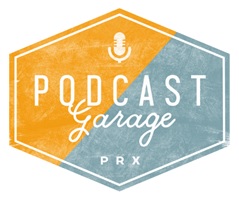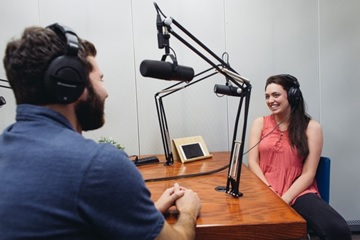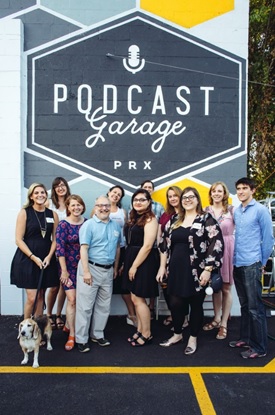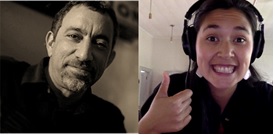If you’re in public radio, you know all about PRX – or The Public Radio Exchange. It’s the media company behind some of public radio’s most popular shows, including This American Life, The Moth Radio Hour, and Reveal. PRX.org serves as a distribution marketplace, offering more than 100,000 station and independently produced audio for stories for broadcast and digital.
 Two years ago, PRX launched Radiotopia, a curated network of story-driven shows, in partnership with podcaster Roman Mars, creator of 99% Invisible.
Two years ago, PRX launched Radiotopia, a curated network of story-driven shows, in partnership with podcaster Roman Mars, creator of 99% Invisible.
PRX’s CEO is Kerri Hoffman, an innovator in podcasting, new financial models, and audience growth. She’s worked in the non-profit sector for more than two decades, and now runs one of public radio’s most innovative ventures. Today, she’s our guest for “Radio’s Most Innovative,” talking about the newest PRX venture, The Podcast Garage in Boston. It’s a communal effort to bring podcasting to the masses, something we saw up close this summer at the Podcast Movement conference in Chicago.
Everyone’s research shows that podcasting is on the verge of a true breakout. Efforts like The Podcast Garage typify the notion this platform isn’t just about the big-names and celebrities, but the opportunity for anyone with a microphone and an idea to be become a podcaster.
Here’s the story behind this new podcasting initiative:
JM: Give us some history and background on the PRX Podcast Garage.
KH: The Podcast Garage is an exciting addition to Zone 3, a Harvard-sparked initiative to explore experimental programs, events, and retail along Western Avenue. Part of Harvard’s long-term plan is to create pop-up art installations along the corridor. Harvard’s consulting firm, Graffito, is a big fan of our shows and asked if we would be interested in programming listening events and trainings. We came back with a proposal for a more permanent facility that serves as a resource for local podcast producers, and can also become a gateway for the next generation of producers.
We provide recording booths with state of the art recording equipment, open space for group activities, and communal working space.

JM: What is its mission?
KH: The Podcast Garage is Boston’s first street-level community space dedicated to the art, craft, business and technology of audio making. It will serve as a nexus of hyper local, national and international voices, stories, convenings and collaborations.
PRX is committed to helping independent podcast producers find and grow their best and most supportive audience. The Podcast Garage is another way for us to reach and support experienced and emerging producers by helping them grow their craft and their audience. We are particularly excited about how The Podcast Garage addresses our mission of creating open space where unexpected creative expression can happen.
JM: What are the costs of recording and producing a podcast in The Podcast Garage?
KH: We are committed to providing low-to-no-cost access to the studio. We know when the meter isn’t ticking loudly, producers take more risks and experiment more.
We offer one free hour per day, first come first served, plus:
- $60/hour (available in 15 minute increments) for use of the large studio, no engineer included, which includes access to co-working space day-of reservation. $30/hour for the vocal booth.
- $99/month for 3 hours/month of recording and access to co-working space during business hours.
- Institutions/Corporations: $120/hour, no engineer included.
JM: Are you looking for the next podcasting superstar, or is there something else you’re trying to accomplish?
KH: We are always looking for new voices and untold stories and look forward to discovering and cultivating local talent at the Podcast Garage. Our services and public events will hopefully open the door to unexpected talent looking to connect with fans.
JM: PRX has had great success with national podcasts like This American Life, The Moth Radio Hour, and Reveal. Why go completely in the other direction with such a ground floor effort?
KH: The next generation of podcast producers may not be from broadcast shows. Radiotopia has some of the most popular podcasts in the world, as evidenced by their size and reach. None of our Radiotopia shows was made for broadcast; they are designed for a digital listening audience. In the early days of PRX we used the tagline “Making public radio more public.” We retired that years ago, but it feels truer now than ever before. Podcasting has lowered the barrier to entry for audio storytellers and journalists to reach audience.
JM: What types of podcasters show up to record?
KH: Anyone and everyone! Both established podcasters, and up-and-comers.
 JM: What is the difference between The Podcast Garage studios and the air studios found in radio facilities?
JM: What is the difference between The Podcast Garage studios and the air studios found in radio facilities?
KH: One, we don’t have an engineer on staff. Two, we have the four most popular types of editing software available on site so producers don’t have to leave with a raw file, they can do some post production editing and fixing in one session. Another difference is that we’re not ever live on air, so there’s just a whole set of requirements that we aren’t concerned with.
JM: Why isn’t there an engineer on site? And how have you compensated for this with the type of equipment and software available?
KH: Most podcasts don’t need one, so there’s no reason to make them pay for one. Once we hit record there is little for an engineer to do. It is rare for a podcast to need someone to operate the phone during a session, and there’s no mixing going on since the raw output of every mic is being recorded individually. Other than just watching to make sure things are working okay, the engineer doesn’t have much to do.
In cases where some degree of board control is required during a session, producers can bring their own engineer or work remotely with an iPad app that provides complete control of the mixer. This allows for metering and gain adjustments to ensure the sound quality of the recording is as good as possible. It also means you can, for example, mute an interviewee on the phone line momentarily if needed. We picked a digital mixer with remote control capabilities specifically for this reason.
 JM: The Garage also hosts events and workshops. Talk about why you do them and the effect on the success of the initiative.
JM: The Garage also hosts events and workshops. Talk about why you do them and the effect on the success of the initiative.
KH: We are interested in fostering community—online, in person and through our shows. Podcasting can be a lonely pursuit—many producers work in make-shift studios in their homes and do a lot of their writing in coffee shops and libraries. The Garage allows us to have a space for unexpected connections.
Since PRX has always been a digital distributor and an early experimenter in podcasting, we have a remarkable vantage point in understanding the ambitions and the friction points for producers. We have built technology to support digital distribution and have learned a lot of valuable lessons through our experiments. We will host educational sessions, mixers, and listening sessions that focus on some of those friction points. Whether it is helping producers to understand the importance of metadata, gain an understanding of the third party ecosystem, how to take advantage of technical tools and services or a better understanding of the creative process, we will experiment to provide the events and workshops that have the biggest impact.
Additionally, the Garage allows us to engage with Harvard and the HarvardEd Portal, which fosters innovative ways of learning and provides programming in creative and performing arts; science and technology; wellness and recreation; and economic, workforce, and professional development for learners of all ages.
JM: What are the benefits PRX derives from doing this? What about for the city of Boston?
KH: PRX is able to have a physical, public space. We’ve never had this before, not even for our own recording purposes. It allows us to better connect with the local audio community, and use our resources to be community leaders. The Garage directly supports the city of Boston’s arts and culture initiatives, and will help to propel those initiatives forward and further enrich arts and culture in Boston.
JM: You’ve only been open a short time, but what’s next after you get through your launch period?
KH: We are prototyping and evaluating the most useful hours of operation, pricing models, and content to fit the needs of our visitors. We will be starting a Salon Series of talks, providing training in technology and marketing of podcasts, and inviting our local public radio stations to host events.
 JM: Who has been the most amazing person to show up so far?
JM: Who has been the most amazing person to show up so far?
KH: At our opening day, we were thrilled that Joe Richman (left) from Radio Diaries and Megan Tan (right), host of Millennial were able to join us in person.
JM: Kerri, best of luck with the project.
KH: Thanks!
INNOVATION QUOTE OF THE WEEK:
“The garage is the space for the hacker, the tinkerer, the maker. The garage is not defined by a single field or industry; instead, it is defined by the eclectic interests of its inhabitants. It is a space where intellectual networks converge.”
Steven Johnson, author
More of Radio’s Most Innovative
- Media And Technology In 2025: Believe It Or Not! - April 18, 2025
- In Radio, You Just Never Know - April 17, 2025
- The Secret To Making A Great Podcast (And Great Radio) - April 16, 2025





Leave a Reply